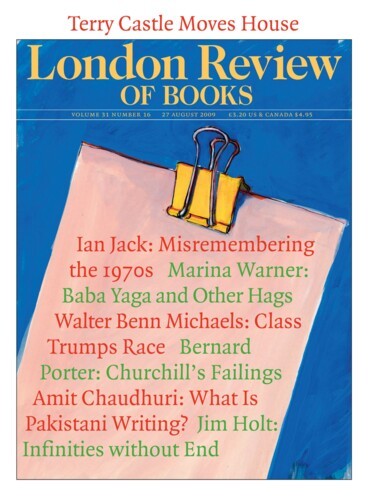The Wood of Lost Things
We went for walks here, as children, listening out
for gypsies, timber wolves, the great
hinges in the trees. Hours
we’d wander its long green halls
making swords from branches,
gathering stars of elderflower
to thread into a chain.
Today the forest sends up birds
to distract me, deer to turn me from the track,
puts out stems and tendrils
to trip and catch at my feet.
The sudden sun opens a path of flowers:
snowdrops, crocuses, hyacinths,
a smoke of bluebells
in the shade on either side;
a way of stamens and stigmas: the breathing
faces of flowers. I look back at the empty trees,
look up at the green, and I’m walking
through daisies and honeysuckle,
fireweed, crab apple, burnt-out
buddleia, a tangle of nettles,
berberis, bramble-wire;
the flowers gone,
just the starred calyx
and the green ovary
hardening to seed.
I take a last look at the yellow trees,
a last look at the brown, and I hear the sound
of old leaves under my feet
and the low noise of water.
I have found the place I wasn’t meant to find.
The shallow creek, churning
its red and silver secrets:
failed salmon, bearded with barbs,
riding each other down;
the shore lined with baby pigeons, animals
birthing, others coming back to die.
Placenta and bones in the undergrowth,
in the clearing, in the places of drowning.
Jellyfish have taken to the woods;
mussels rope the tree-trunks.
I watch a fish flip on a thorn
in a pester of flies, one eye fixed on mine.
The wood stretched behind me, now full
of my own kind, those
who have stepped through my shadow;
a life’s-worth of women in the forest corridor,
faces turned to the bark. The rows of lovers.
Mother and sister. Wife. And my daughters,
walking away into the blue distance,
turning their heads to look back.
Hung on a silver birch, my school cap
and satchel; next to them, the docken suit,
and next to that, pinned to a branch,
my lost comforter –
a piece of blanket worn to the size of my hand.
My hand as a boy. The forgotten smell of it,
the smell of myself.
And something is moving, something
held down by stones, and one by one
I see the dead unbury themselves
and take their places by the seated corpse
whose face I seem to know.
He was shivering. ‘It’s cold,’ I said.
He looked up at me and nodded, ‘It’s cold.’
‘What is this place? What brings you here?’
‘This is my home,’ we replied.
Widow’s Walk
On the passeggiata,
on the rocks
at the Marinella Bar again,
losing what remains of my language
to a thickening rain,
a week of rain
that’s almost stopped the sea.
Trying to escape myself,
but there’s always
someone
wanting to sew my shadow back.
The fisherman on his rock
under the red flags
has two fish in his bucket
swimming nowhere, side by side.
Lines of lacquered beetles
are rowing boats
turned upside-down;
the sea, mother-of-pearl
and broken shells;
the furled parasols
Madonnas in their shrouds.
I walk here
amongst the very old;
we watch the paint
flake from the hotel walls
and I take note, once again,
of the sign spelt out in English:
BATHING IN NOT SURE
FOR LACK OF RESCUE SERVIGE.
I felt like going in,
there and then,
like a widow
toppling forward at the grave;
going in after myself.
The Great Midwinter Sacrifice, Uppsala
It seems I came too late.
The cart-tracks leading
down the hill to the old town
are frosting over, already filling with snow.
If the temple is gold, as they say,
it’s too dark now to tell. I tether my horse
and walk through the ruins of the marketplace,
its stalls empty, the tables of the feast
all cleared; mice among the grain, and dogs,
but few people anywhere.
There’s ice between the cobblestones
where drink was spilt – some scraps of bread,
chicken bones – that’s it.
I had missed the full moon, and the Festival.
Fires sputter here and there but there is little light
and the ground beyond the square
is frozen hard as iron.
I pass what looks like a well in the darkness
– the sharpening wind playing over it
as you would blow on the neck of an empty bottle.
I hear the creaking of a tree so huge
it’s blotted out the moon; some birds, scuffling;
a skitter of rats and a dog’s low growl.
As I near the tree I feel the ground soften, start
to suck at my boot-heels, and I can
make out shapes in the high branches:
long, hanging shapes that seem to
turn slightly in the breeze, which is sweet now
beyond the frost, and I almost
sense some drops of rain.
Moving around it
and into the moonlight, I see it’s as high
as the temple, fully green, and thick with gifts
the way the peasants dress their beams with corn,
at home, at harvest-time. This tree, though,
is decked simply with the dead.
At the top, what look like cockerels, rams
and goats, then dogs and pigs, and hooked
to the lowest, strongest boughs – their legs
almost touching the earth – horses and bulls.
I count nine of each of them, and nine
that aren’t animals but hang there just the same,
black-faced, bletted, barely
recognisable as men.
I look down at the spongy grass
and my boots are soaking red.
My name is Adam of Bremen
and I saw these things
in The Year of Our Lord 1075.
Send Letters To:
The Editor
London Review of Books,
28 Little Russell Street
London, WC1A 2HN
letters@lrb.co.uk
Please include name, address, and a telephone number.

